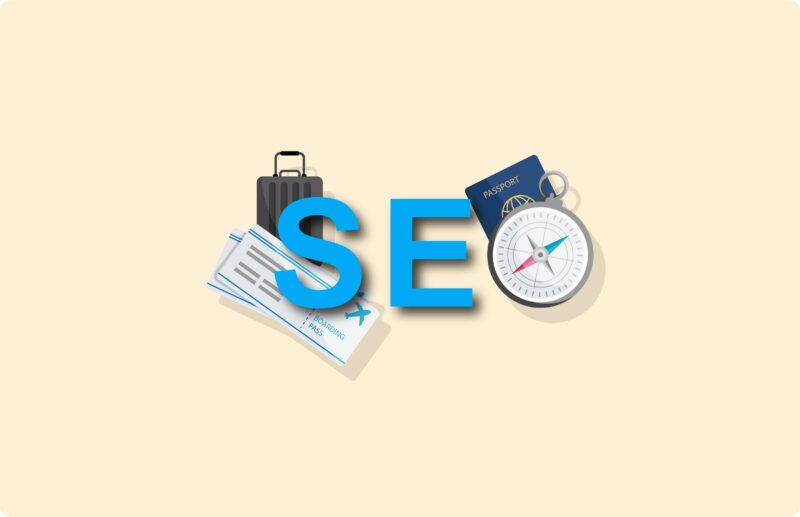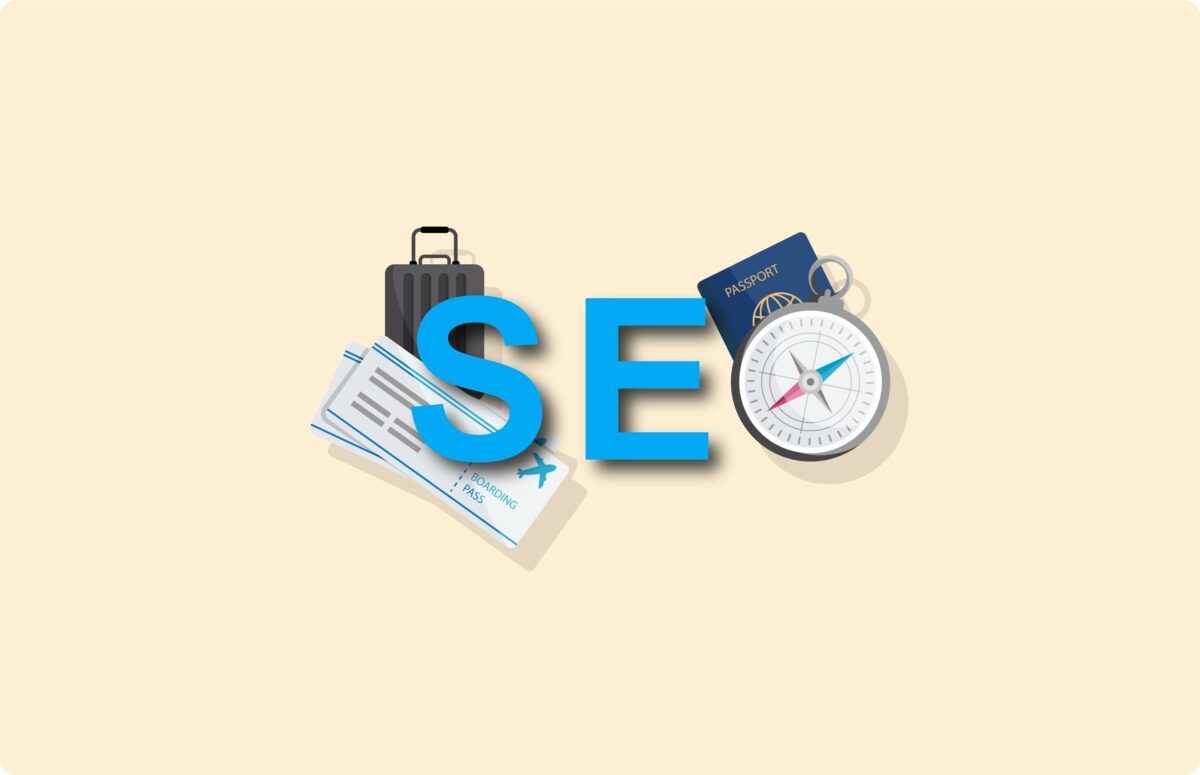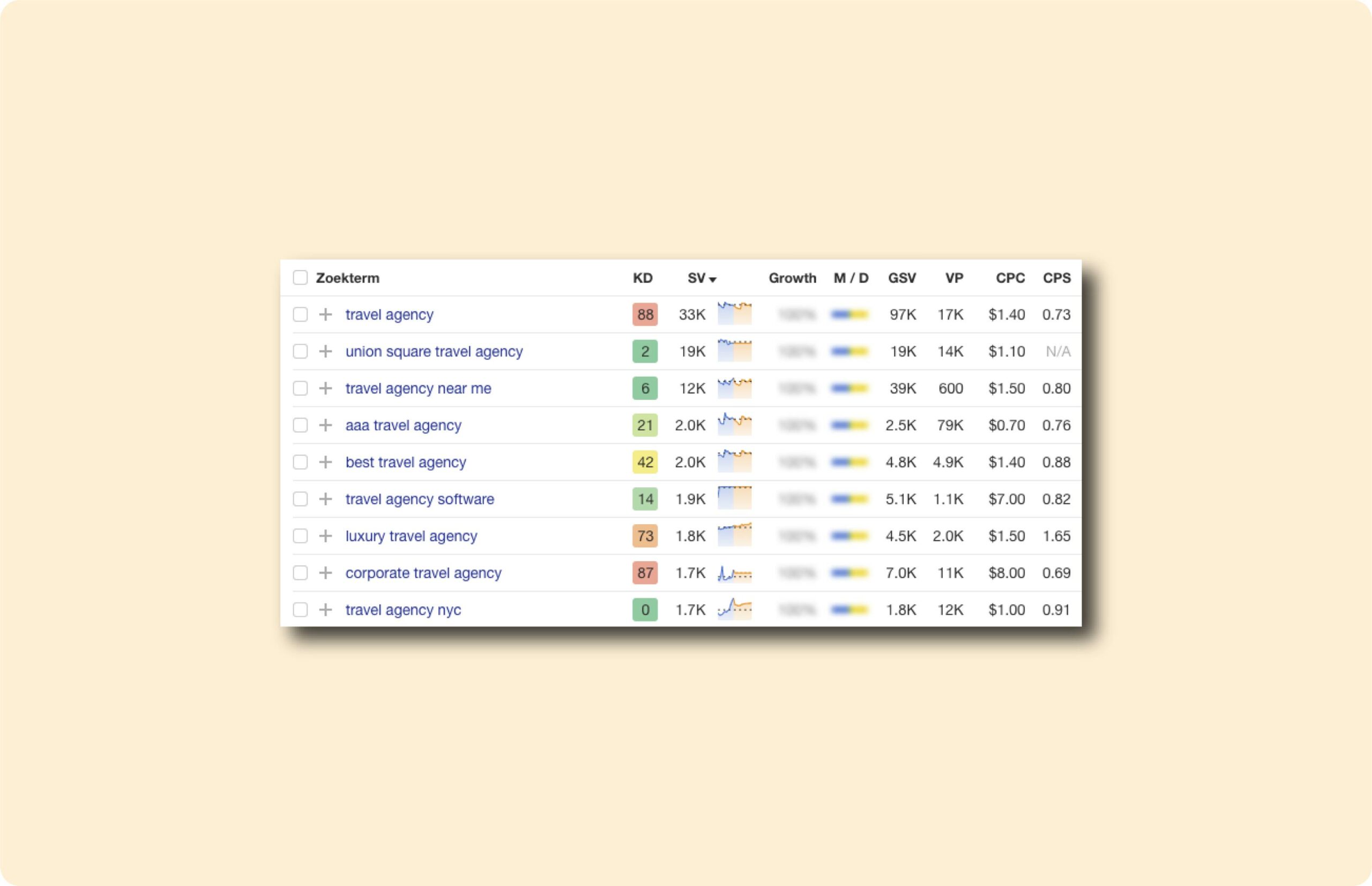SEO for travel agents

SEO for travel agents is all about attracting customers who are actively looking for specific travel destinations, packages and experiences. By optimizing your website and creating valuable content, you can bring your travel offerings to the attention of potential customers. This makes SEO one of the most cost-effective ways to strengthen your online presence. In this article, I discuss how to effectively use SEO to increase your travel agency’s visibility and generate more bookings.
The role of SEO for travel agents
The travel industry is competitive, with lots of competition from large platforms such as Booking.com and Expedia. To stand out as a travel agent, you need to focus on specific niches and unique travel experiences that you have expertise in. Think personalized travel, adventure vacations, or local knowledge of lesser-known destinations. SEO can help you make your unique offerings visible to the right audience.
SEO helps you optimize your website to rank high on relevant searches, such as “luxury travel to [bestemming]” or “personalized travel plans [regio]”. This ensures a steady stream of visitors interested in what your travel agency has to offer.
Content creation for travel agents: Inspire and inform
The basis of a good SEO strategy for travel agents lies in inspiring and informative content. People looking for travel are looking for ideas, advice and details about possible destinations and experiences.

- Destination pages: Create separate destination pages for the countries and cities you offer. For example, if you specialize in travel to Southeast Asia, provide detailed pages for each destination such as “Adventure tours in Vietnam” or “Luxury vacations in Thailand.” These pages can include information about local attractions, activities, and tips specific to that location.
- Guides and travel advice: Offer comprehensive travel guides for your destinations. Think “The ultimate guide to a road trip through Italy” or “What you need to know before you travel to Iceland.” These guides can serve as valuable resources for potential clients, making them more likely to book with your travel agency.
- Blog about travel experiences: Share stories and experiences from previous clients, or write your own blogs about unique travel experiences and tips. This helps to showcase your expertise and inspire people to book their travel with you. Consider topics such as “The best hidden beaches in Greece” or “How to plan the perfect safari in Africa.”
In particular, focus on keywords that meet the following:
- The keywords have volume (they are searched for in Google).
- The keywords are relevant (and bring in conversions).
- The keywords have relatively little competition.
With this combination you can achieve the fastest success within SEO. The travel industry is very broad and so is the selection of keywords. Some examples are:

Local SEO for travel agents
Although travel is global, local SEO plays an important role for travel agencies, especially if you are physically based and offer locally operated services. Many people still look for a travel agency near them, especially if they are looking for personalized advice.
- Optimize your Google My Business (GMB): Claim and optimize your GMB profile with all business information, such as address, opening hours and contact information. Add photos of your office, clients and maybe even images of trips you offer. Encourage satisfied customers to leave reviews as this can increase your travel agency’s visibility and credibility.
- Use local keywords: Add local keywords to your content, such as “travel agency in [stad]” or “luxury travel from [locatie]”. This will help you be more visible in local search results and attract customers who want personal contact.
- Location-specific landing pages: Create separate landing pages for the different cities in which you operate. For example, a page such as “Travel agency in Utrecht for adventure travel” will help you attract local traffic and reach potential customers in your area.
If you have multiple locations that people can walk into, you can also open multiple branches through Google My Business and show up in local search results for multiple keywords.
The most important thing in optimizing this is to actually collect reviews by location through Google My Business. This accounts for much of the ranking of these results.
SEO focused on intent: attracting quality leads
The goal of SEO for travel agents is not just to attract traffic, but more importantly to generate quality leads who will actually consider booking a trip with you.
- Conversion-oriented keywords: Optimize your website for keywords that indicate strong buying intent.
Consider terms such as “all-inclusive trip booking,” “custom travel quote” or “private tours
“. These keywords indicate that the user is already further along in their decision-making process and ready to take action. - Long-tail keywords: Target specific long-tail keywords such as “best luxury safari trips in Kenya” or “customized family vacations in Spain.” These search terms often have less competition and attract highly targeted customers who know exactly what they want.
Conversion-oriented landing pages
SEO for travel agencies is about more than just attracting visitors – you want to convert those visitors into customers. That’s why your landing pages should focus on conversion.
- Clear CTAs and quote requests: Make sure every landing page and blog contains clear call-to-actions (CTAs). This could be “Request a quote for your dream trip” or “Schedule a consultation.” Make these CTAs prominent and inviting so visitors can take immediate action.
- Booking Forms: Offer simple and user-friendly booking forms on your website. The fewer barriers there are to booking a trip or requesting a quote, the more likely you are to turn a visitor into a customer.
- Social proof and customer stories: Post testimonials from satisfied travelers who have booked their dream trip with you. This instantly builds trust with new visitors and encourages them to book with your travel agency as well.
Of course, it depends on what the purpose of the website is and how busy it is for the different departments of the company. You can iterate yourself with a little more or less lead qualification on the website. Do you want more inquiries and does the quality matter a little less? Then you can do less lead qualification on the website.
Technical SEO and usability
A fast, user-friendly website is key to improving your SEO performance and retaining visitors.
- Mobile-friendliness: Many people book their trips via their cell phones, so make sure your website is fully responsive and works well on mobile devices. This means forms, CTAs and navigation should be easy to use regardless of the device.
- Website speed optimization: Speed is crucial. If your website is slow, potential customers will drop out early. Optimize your images, use caching and minimize unnecessary scripts to improve the load time of your pages.
- Security and Trust (SSL): Because people often provide sensitive information when booking a trip, it is important that your website is secured with an SSL certificate (HTTPS). This builds trust with customers and helps improve your SEO performance.
For travel websites that are already somewhat larger, technical SEO is becoming increasingly relevant and important. In particular, it creates more trust and a better user experience (which in turn benefits site conversions).
Link Building
Link building is a powerful tool to increase your authority and improve your SEO performance.
- Collaborate with travel blogs and influencers: Collaborate with travel-related blogs and influencers to write guest articles or promote your travels. This can help you get valuable backlinks and increase your reach.
- Customer reviews and listings: Encourage customers to review your travel agency on platforms such as Google and TripAdvisor. This not only helps boost your local SEO, but also builds trust with new clients.
Conclusion
SEO for travel agencies is all about increasing your online visibility, inspiring and informing potential customers and converting visitors into bookings. By focusing on valuable content, local SEO, conversion-oriented keywords and a user-friendly website, you can ensure that your travel agency is more findable in search engines. This leads not only to more traffic, but also to more bookings and satisfied customers who are eager to return to you for their next adventure.






